
views
Crafting Appealing Online Products
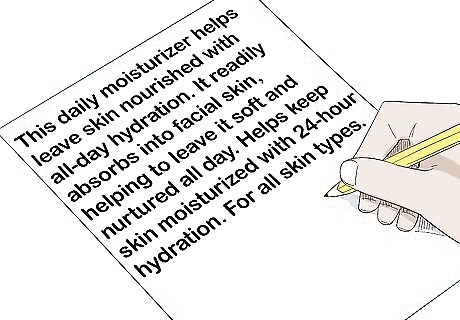
Write a short paragraph describing the product. Limit the product description to about 4 or 5 sentences. This is enough to give guests an accurate idea of what the product is. Longer descriptions don’t work because the important details get lost in the text and most customers won’t read the whole thing.
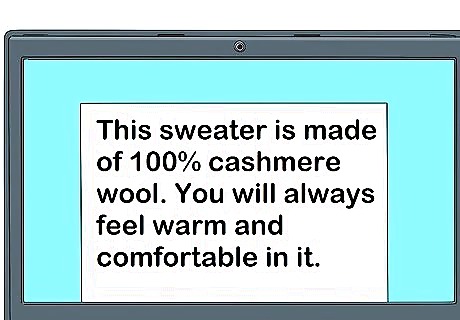
Use vivid but simple words in the description. Product descriptions needs to be both appealing and easy to understand. To accomplish this, avoid cli·chés or jargon. Instead, write a few descriptive sentences about your product and what makes it special. For example, say, “This sweater is made of 100% cashmere wool. You will always feel warm and comfortable in it.” This informs potential buyers about the product as well as tells them what to expect from it. A cli·ché would be something like, “This is the best sweater ever. You are missing out by not buying it now. It will change your life.” Instead of saying, “The vibranium alloy in this car keeps people safe,” say, “Because of the new metal, this car will keep you and your family safe in case of an accident.”
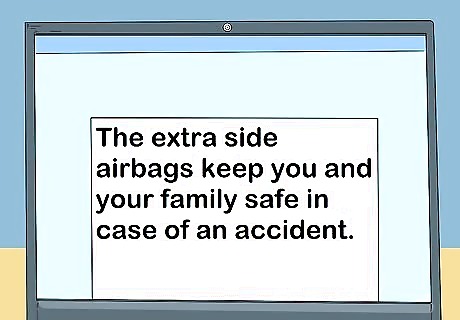
Highlight the product’s benefits in the description. Read over your description to make sure it mentions what the consumer gets out of owning the product. Limit yourself to discussing the top 2 or 3 benefits. These are your strongest reasons and should be the most appealing ones for customers. Think of what a customer expects from a product. For instance, safety is an important feature for cars. Say, “The extra side airbags keep you and your family safe in case of an accident.” A minor benefit might be, “This car has an extra phone charger socket underneath the armrest.”

Post pictures and videos of the item. Take a few clear pictures in a well-lit environment. Use simple but colorful backgrounds, but keep the product the focus of picture or video. It should be large enough in the frame for customers to see it as clearly as possible. For videos, show off the product’s benefits as well as its appearance. Having a person model the item is a plus, such as with clothing. You can use a dummy, but zoom in with the camera to focus on the item. Video game publishers post screenshots and in-game footage to make their games look appealing, for example.
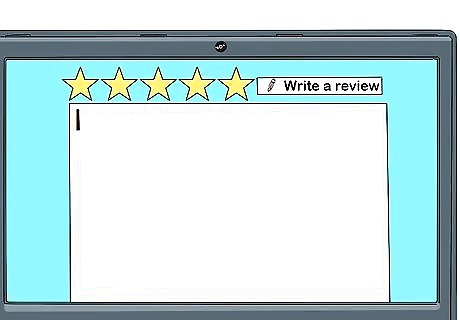
Ask your customers for reviews. Many sites have review systems built into their websites. After you make a sale, ask the buyer to leave a review. Reviews help you build a positive reputation, which encourages other customers to make a purchase. Try reminding them to leave a review after you complete the transaction. Say something like, “If you have some spare time, could you please leave me a review?” Include a link to the review page in emails or mention the review page when talking to customers on the phone.
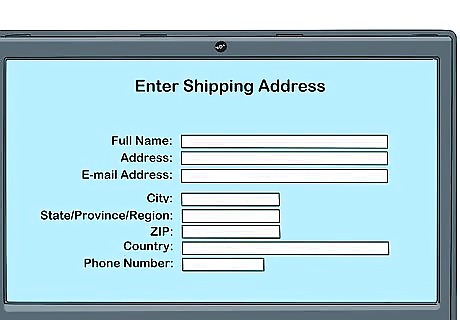
Discuss any special terms and conditions they need to know. This includes information about shipping, making payments, information privacy, and the seller’s contact details. Most online sites have separate pages detailing these policies. If you run an online storefront or hold an auction, you should list your own policies on the product’s page as needed. Details like shipping and the return policy are always relevant and should be prominently displayed on your page. Include contact information such as an email address customers can use in case they need more information.
Creating Urgency
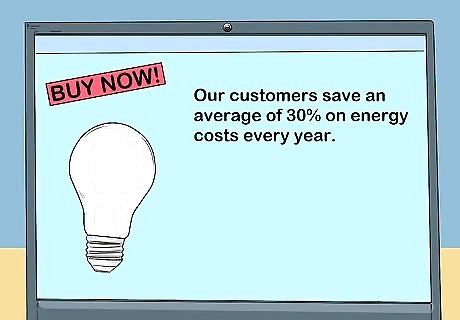
Emphasize what is unique about your product. If your product is unique, the customer misses out by not buying it immediately. Avoid saying anything negative about competitors. Instead, focus on explaining what your item does better than other products. For example, say, “Our customers save an average of 30% on energy costs every year.” Be specific. Saying, “This light bulb reduces your energy usage” isn’t convincing. Anyone selling a lightbulb can say it.
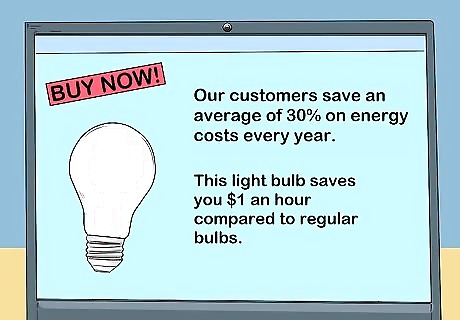
Describe how the item will solve a customer’s needs. Provide concrete reasons for how the item helps the consumer right now. They should feel like they are missing out by waiting. Note a couple of ways a customer’s life would change by owning the item today. For example, you could say, ”This light bulb saves you $1 an hour compared to regular bulbs.”
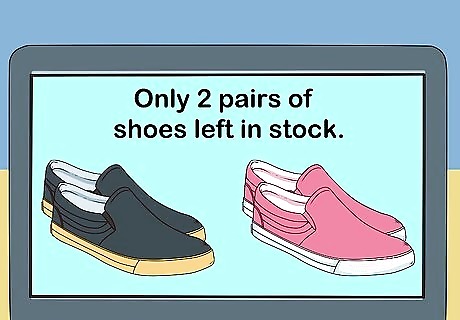
Hint that the product is in high demand. Scarcity encourages potential customers to make a quick decision about buying. Items that are popular, limited, or retired are often the most sought after. Anytime you think of a way to do this, mention it to the customer or write it directly onto your sales page. For instance, your sale page might say, “Limited! Only 2 pairs of shoes left in stock.” You might hint to a customer, “This video game has been super popular lately. I had 6 people ask me about it yesterday and I’ve heard it’s very good.”
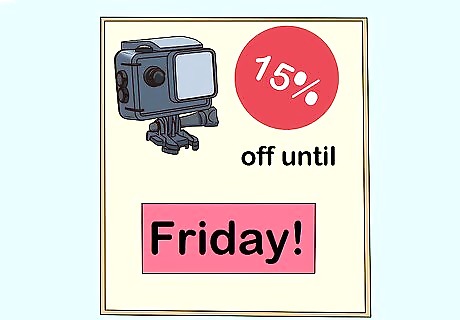
Use sales to create a purchasing time limit. Sales are also a sort of scarcity. Tell people there is a sale or keep the sale information listed near your item. Even if the sale doesn’t offer a big discount, it can encourage customers to act now. Something as simple as “15% off until Friday!” can encourage customers to make the purchase.

Explain why customers should buy the item today. Customers often feel unsure and come up with reasons to avoid making a purchase. Read your product and benefit descriptions again, then think of reasons why you would pass on a purchase. If you can explain why these objections aren’t meaningful, you can convince a reluctant customer to make a purchase. Money, time, and a desire to discuss the decision with a partner are a few objections you can overcome. Utilize the time you have to make the benefits sound more appealing in order to overcome all 3 of these objections. You only get one shot online. Refine your description by focusing on the benefits. For offline sales, respond to the objections directly. For example, if a person says “I need to think about it,” you can explain more benefits about buying the product as well as the return policy.
Convincing Buyers in Person

Meet the person face to face. If you are able to discuss a sale face to face, take the opportunity. Displaying your personality gives you a greater chance of completing a transaction than words or phone calls do. An in-person meeting means an opportunity to respond to the other person’s body language. For an online sale, say something like, “Would you like to come look at the item?” For comfort, invite them to a public place. Try to have the conversation at an opportune time, such as after a meal or another time when the person is in a good mood.

Let the potential buyer handle the product. Rather than simply discussing the item, bring the customer to it. Let them hold it, feel it, or even give it a test run. This gives the customer a chance to observe the item’s qualities, making them more likely to buy it. For example, car dealerships let their customers test drive cars. Many retail stores have changing rooms where you can put on clothing before making a decision.

Speak with confidence but stay relaxed. Look the person in the eye and speak with a loud, steady voice. To do this, know what you want to say in advance. Practice it at home as needed until you feel comfortable saying it. Avoid going overboard with enthusiasm, since that makes you seem false. Avoid using filler words like “uh” and “um.” Talk like you would with anyone else. Let your enthusiasm build naturally as you discuss the product.
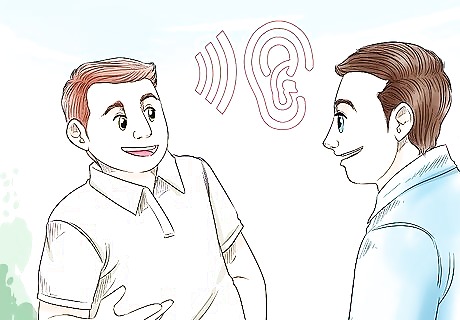
Listen to the other person speak. Pay attention to what the other person has to say. If you stop listening, you may get caught up in whatever sales pitch you rehearsed. Remember to meet the person on their level, staying friendly and responding to any concerns they have. If someone goes off on a tangent about a fishing trip, engage them on it. A car salesperson might then say, “This truck would have given you plenty of room to store your equipment.”

Mirror the other person’s behavior. Matching the other person’s behavior makes them feel more comfortable. Simply talk like they do and use the same body language. This also forces you to pay attention to the other person speaking, which helps you be more convincing when it’s your turn to speak. For example, if someone uses a lot of hand gestures while speaking, you should do this too. If the person has their arms crossed, hold back and act a little more restrained.

Negotiate with the other person. Many salespeople use reciprocity to encourage a purchase. Try sealing the deal by offering a special discount or another gift. Even doing something like writing a personalized note of appreciation makes a sale more likely. For example, some stores offer complimentary cups of coffee. Some dentists give out free toothbrushes after each visit.

Thank the person for their time. No matter what answer you expect to get from the other person, stay respectful. Thank them for taking the time to listen to you. A simple “thank you” makes the situation feel more friendly, especially after a long discussion. Simply say, “Thank you for your time.”

Come back later if a person says no. Be respectful when a person says no. If you have offered all the reasons possible to make the purchase, avoid pressing any further. Drop the issue for at least a few days, usually weeks or months if possible. Wait until you have an appropriate opportunity to ask again. If you are talking to a stranger, you can say, "Come back if you have any questions." If you are online, make use of storefront links, advertisements, social media posts, and newsletters to bring people back. Talk to them again at another good time. With a little time to think things over, they may change their mind.












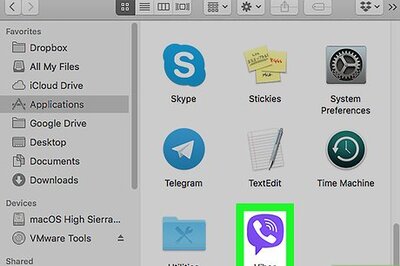






Comments
0 comment